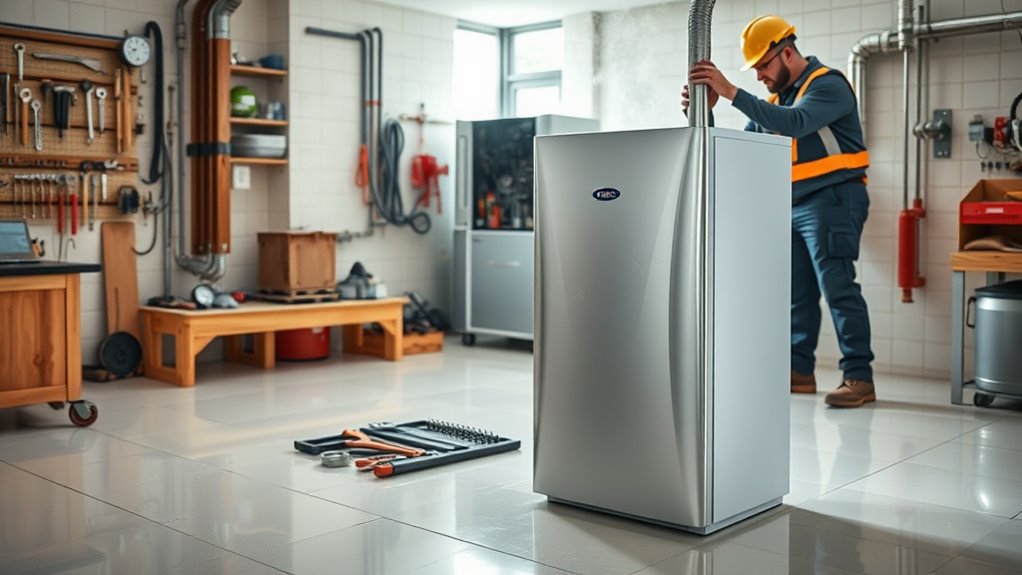Fitting a new boiler is indeed a big job that requires careful planning and expertise. It involves evaluating your heating needs and ensuring compatibility with existing systems. You’ll need the right tools and safety equipment for proper installation. The process can also include site evaluations and securing necessary permits. While DIY might save some money, professional installation guarantees reliability and efficiency. Discover more about the entire installation process and key considerations that come with it.
Key insights
- Fitting a new boiler involves careful planning and assessment of the installation site to ensure compatibility with heating needs.
- The process requires specific tools and equipment, including wrenches, drills, and safety gear, highlighting its complexity.
- Professional installation is recommended for safety and efficiency, as improper installation can lead to performance issues and warranty voiding.
- The task typically includes removing the old boiler, which can add to the time and effort required for installation.
- Overall, while it can be a significant job, professional help streamlines the process and ensures proper functioning.
Understanding the Importance of a Boiler
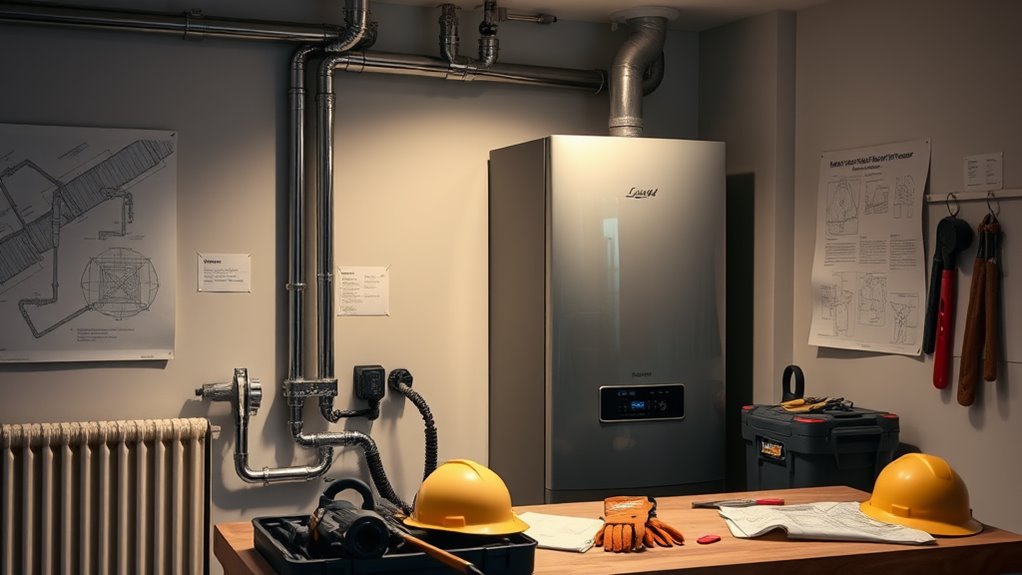
A boiler is essential for maintaining a comfortable living environment, as it provides necessary heating and hot water for your home. Understanding the importance of your boiler goes beyond mere comfort; it directly impacts your energy bills and environmental footprint. High boiler efficiency guarantees that you’re getting the most out of your fuel, minimizing waste while maximizing heat output. This efficiency not only saves you money but also enhances heating reliability, making sure that your home remains warm regardless of external temperatures. Regular maintenance is critical, as it helps maintain peak performance, prolonging your boiler’s lifespan. By prioritizing boiler efficiency and reliability, you’ll enjoy a consistently comfortable living space while reducing your overall energy costs. Regular commercial boiler service is crucial for ensuring safe and efficient operation, which can prevent costly repairs down the line.
Signs That You Need a New Boiler
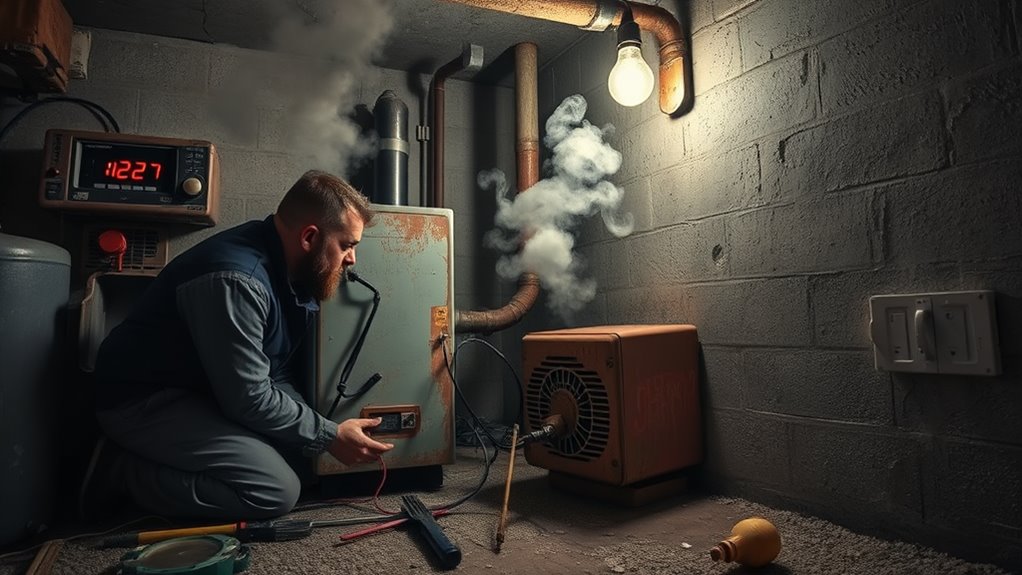
If you’re experiencing frequent breakdowns with your boiler or noticing a significant rise in your energy bills, it may be time to contemplate a replacement. Additionally, unusual noises coming from the unit can signal underlying issues. Recognizing these signs early can help you avoid more costly repairs down the line. Consider consulting a professional for an energy assessment, which can identify areas for cost-saving improvements related to your heating system.
Frequent Breakdowns Occurring
Experiencing frequent breakdowns with your boiler can be a clear indicator that a replacement is necessary. If you find yourself scheduling frequent repairs, it’s important to assess whether the cost of these fixes outweighs the benefits of keeping the existing unit. A boiler that consistently malfunctions can signal declining boiler efficiency, leading to inadequate heating and increased wear on components. These breakdowns often lead to inconvenient heating interruptions, impacting your comfort. Additionally, older boilers typically struggle to operate at peak efficiency, resulting in more frequent issues. If repair costs accumulate or you notice a pattern of failures, consider investing in a new boiler. This proactive approach can enhance your home’s heating reliability and overall energy performance. Regular preventive maintenance tips can help mitigate the risks of breakdowns and prolong the lifespan of your boiler.
Rising Energy Bills
When your energy bills rise unexpectedly, it might signal that your boiler is no longer performing efficiently. An inefficient boiler consumes more fuel, leading to increased costs. If you notice a consistent upward trend in your energy expenses, it’s time to evaluate your boiler’s performance. Modern boilers are designed with advanced energy efficiency technologies that greatly reduce fuel consumption, translating into cost savings over time. If your current boiler lacks these features and struggles to maintain a comfortable temperature, consider replacement options. Investing in a new, high-efficiency boiler not only lowers your monthly bills but also contributes to a more sustainable energy footprint. Ultimately, recognizing these signs early can save you money and enhance your home’s comfort. Regular maintenance and servicing can prevent common boiler issues and ensure optimal performance.
Unusual Noises Present
Unusual noises from your boiler can be a clear indicator that it’s time for an upgrade. If you hear banging, hissing, or whistling sounds, it’s vital to identify the potential causes. Banging often signifies a build-up of sediment in the heat exchanger, leading to overheating. Hissing could indicate a pressure issue or a leak in the system, while whistling may point to air trapped in the pipes. These unusual sounds suggest that your boiler’s efficiency is compromised, and ongoing repairs may not be cost-effective. Ignoring these symptoms can lead to further damage, resulting in a complete breakdown. If you notice these noises consistently, consider consulting a professional to assess whether a new boiler is necessary. Additionally, persistent issues like the Ea error code may require expert diagnostics to prevent prolonged downtime.
Types of Boilers Available
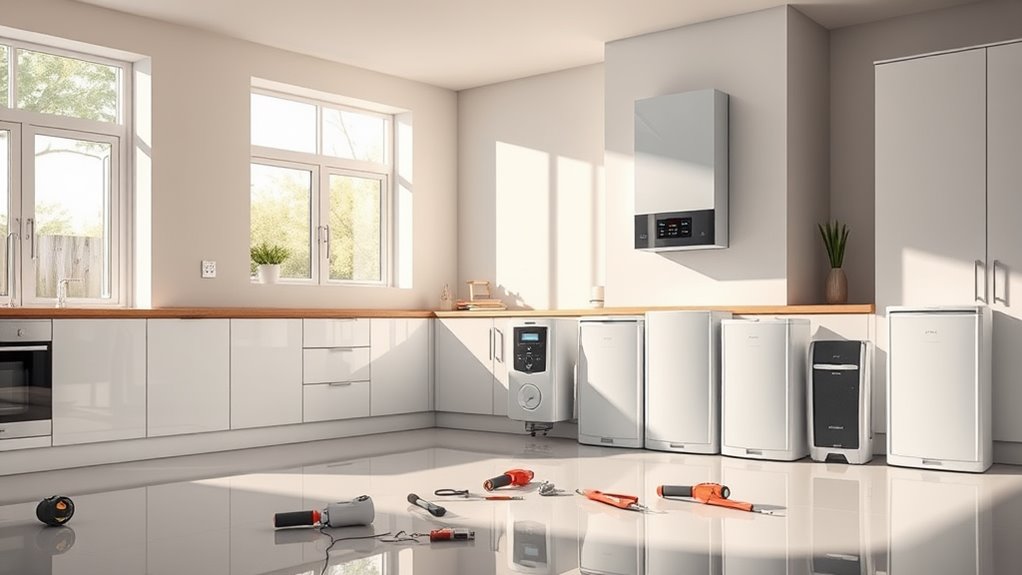
When selecting a new boiler, it is crucial to understand the different types available to meet your needs. Combi boilers, system boilers, and regular boilers each offer distinct features and benefits. Knowing these options will help you make an informed decision for your home’s heating system. Additionally, considering the energy efficiency of commercial boilers can further enhance your choice, ensuring you select a system that reduces fuel consumption and lowers energy bills.
Combi Boilers Overview
Combi boilers, or combination boilers, are a popular choice for homeowners seeking an efficient heating solution. They provide both heating and hot water on demand, eliminating the need for separate water tanks. This design considerably enhances combi boiler efficiency by reducing energy waste. With a compact size, they fit easily into smaller homes, saving space while delivering powerful performance.
One of the key combi boiler benefits is their ability to heat water instantly, so you won’t have to wait for your hot water supply. Additionally, they require less maintenance than traditional systems, as there are fewer components to monitor. Overall, if you’re looking for a reliable, space-saving option, a combi boiler could be the ideal fit for your needs. Regular preventative maintenance tips can further ensure your boiler operates efficiently and lasts longer.
System Boilers Explained
System boilers are designed to deliver both heating and hot water through a centralized system, making them an excellent option for larger homes with higher demands. They work with a hot water storage cylinder, ensuring you have a steady supply of hot water.
Advantages of system boilers:
- Efficient heating for larger spaces
- Reduced installation complexity since components are built-in
- Quick hot water supply for multiple outlets
- Lower running costs compared to older systems
Disadvantages of system boilers:
- Requires space for the hot water cylinder
- Limited hot water supply if the cylinder runs out
- Higher initial installation cost
- May not be suitable for smaller homes with lower demand
Understanding these pros and cons helps you make an informed choice. Additionally, regular maintenance and monitoring of boiler pressure can help prevent issues like error codes that may affect performance.
Regular Boilers Features
Regular boilers, often referred to as traditional or heat-only boilers, are a staple in many homes and offer a reliable solution for heating and hot water needs. They work by heating water in a storage tank, providing hot water on demand. One significant feature is their boiler efficiency, which can vary depending on the model and installation. When choosing a regular boiler, pay attention to its energy ratings, as these indicate how effectively it converts fuel into heat. Higher energy ratings generally mean lower operating costs and reduced environmental impact. Regular boilers are ideal for homes with existing hot water storage systems and can be an excellent choice for those seeking dependable heating solutions. Additionally, exploring options like commercial heat pumps can provide a more energy-efficient alternative for larger properties.
The Boiler Installation Process
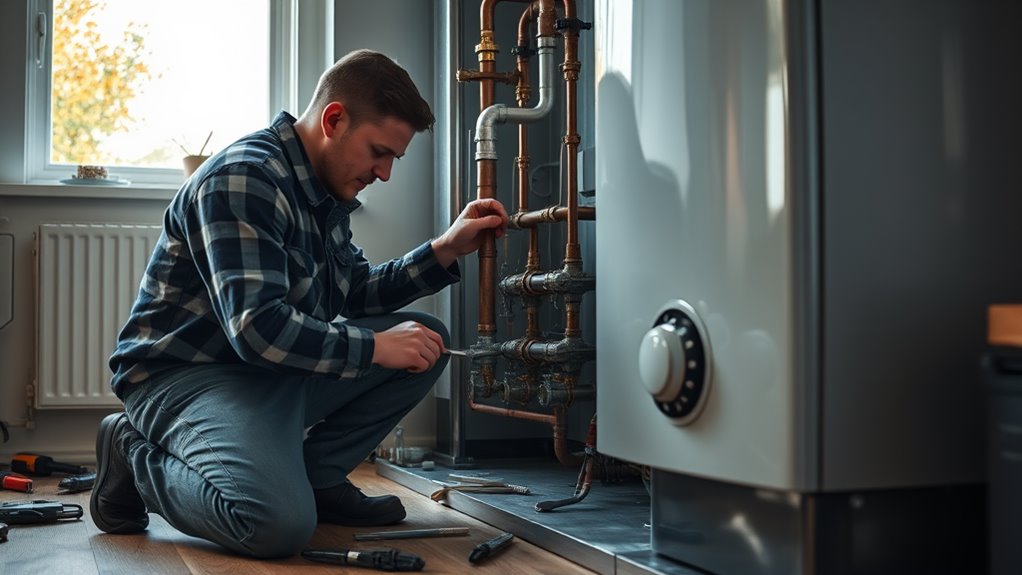
When you decide to install a new boiler, understanding the installation process is essential to guarantee efficiency and safety. Begin by reviewing the boiler specifications to verify compatibility with your heating needs. Next, follow a structured installation timeline to facilitate a smooth operation.
Key steps in the process include:
- Preparation: Assess the installation site and gather necessary permits.
- Removal: Safely disconnect and remove the old boiler.
- Installation: Position the new boiler, verifying all connections align with manufacturer guidelines.
- Testing: Conduct thorough checks to confirm proper functionality and safety compliance. It is also crucial to ensure that your new boiler meets legal compliance standards to avoid potential penalties and ensure safety.
Tools and Equipment Required
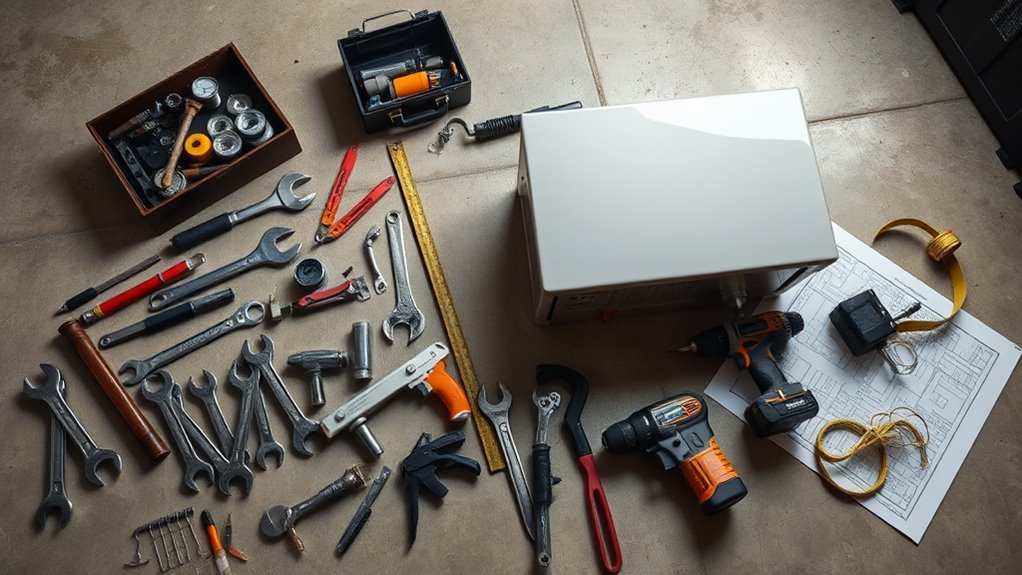
To guarantee a successful boiler installation, it is important to have the right tools and equipment at your disposal. Start with a pipe wrench and adjustable spanner for securing and loosening fittings. A drill and appropriate drill bits are necessary for mounting brackets and creating holes for piping. You’ll also need a level to make sure the boiler is installed correctly. A measuring tape helps you accurately gauge distances, while a screwdriver set will assist with various screws. Safety equipment, like gloves and goggles, is essential for your protection. Don’t forget a multimeter to check electrical connections and a vacuum to clean up. Having these important tools ready will streamline your boiler installation process and enhance safety.
DIY vs. Professional Installation
Choosing between DIY and professional installation for your new boiler can considerably impact both the efficiency of the system and your overall investment. While DIY advantages include cost savings and a sense of accomplishment, the risks may outweigh the benefits if you’re not experienced.
Consider these factors:
- Time Investment: DIY might take longer without expertise.
- Safety Risks: Incorrect installation can lead to dangerous situations.
- Warranty Issues: Many manufacturers require professional installation for warranty validity.
- Long-term Performance: Professional expertise guarantees peak efficiency and reliability.
Ultimately, weigh the pros and cons carefully. If you’re uncertain about your skills or the complexity of the installation, hiring a professional can save you headaches and guarantee your boiler operates safely and efficiently.
Cost Considerations
Cost factors play an essential role in your decision to install a new boiler. Begin with budget planning to determine how much you can allocate for this project. Keep in mind that the price of the boiler itself varies widely based on the type, efficiency, and brand. You’ll also need to factor in additional costs, such as installation labor and any necessary modifications to your existing system. It’s wise to gather multiple installation quotes from qualified professionals to guarantee you’re getting a fair price. Don’t forget to reflect on long-term savings from energy-efficient models, which can offset initial expenses. By carefully evaluating these cost elements, you can make an informed decision that fits your financial situation.
Common Challenges During Installation
Even with a solid budget in place, you may encounter various challenges during the installation of your new boiler. These installation difficulties can arise unexpectedly, requiring quick problem-solving and adjustments. Here are some common issues you might face:
- Space Constraints: Limited room may complicate the installation process and require creative solutions.
- Existing Plumbing Adjustments: You may need to modify current plumbing setups to accommodate the new unit.
- Electrical Requirements: Ensuring that your electrical system meets the boiler’s demands can present challenges.
- Compliance with Regulations: Maneuvering through local codes and regulations can delay the installation if not properly addressed.
Maintenance Tips for Your New Boiler
To guarantee your new boiler operates efficiently and lasts for years, regular maintenance is essential. Begin with routine inspections at least once a year to catch potential issues early. Check the pressure gauge regularly; ideal levels guarantee boiler efficiency. Bleed radiators monthly to remove trapped air, enhancing heat distribution. Clear any debris around the boiler to maintain airflow and prevent overheating. Additionally, monitor water quality; high mineral content can damage components, so consider a water softener if necessary. Don’t forget to clean the condensate pipe to avoid blockages that affect performance. By prioritizing boiler upkeep, you’ll improve energy efficiency, reduce operational costs, and prolong the lifespan of your system. Remember, a well-maintained boiler is a reliable one.
Frequently Asked Questions
How Long Does a Boiler Installation Typically Take?
Boiler installation typically takes one to two days, depending on the boiler types and the complexity of your existing system. If you’re upgrading from an old unit, expect some additional time for modifications. Installation costs can vary widely, influenced by the type of boiler you choose, labor rates, and any required plumbing or electrical work. Always get a detailed quote to understand the total investment before starting the process.
Will I Need to Obtain Permits for Installation?
Yes, you’ll likely need to obtain permits for your boiler installation. Permit requirements vary by location, so check with your local building authority to confirm compliance with installation regulations. Not adhering to these regulations can lead to fines or safety issues down the line. It’s vital to have the necessary approvals before starting the installation to assure your new boiler operates safely and efficiently. Always consult a professional for guidance on the process.
Can I Install a Boiler in a Small Space?
Yes, you can install a boiler in a small space. Choosing the right boiler size is essential; compact models are designed specifically for limited areas. Look for space-saving options like combi boilers, which combine heating and hot water in one unit, minimizing footprint. Additionally, guarantee proper ventilation and clearance around the boiler for safety and efficiency. With careful planning, you can maximize your available space while securing reliable heating.
What Should I Do if My Boiler Leaks After Installation?
If your boiler leaks after installation, you should act quickly. First, turn off the boiler and shut off the water supply. Use leak detection methods like inspecting joints and valves for moisture. Document the leak for maintenance records. Contact a professional for boiler maintenance tips to resolve the issue effectively. Regular checks can prevent future leaks, ensuring your system operates safely and efficiently. Don’t ignore any signs of water damage.
Are There Warranties Available for New Boiler Installations?
Yes, there are boiler warranties available for new installations. Most manufacturers offer boiler warranties that cover parts and sometimes labor, depending on the installation coverage you’ve chosen. Typically, these warranties range from one to ten years, so it’s essential to read the terms carefully. Make certain your installation complies with the manufacturer’s guidelines to avoid voiding the warranty. Check with your installer for specific options and what’s included in your coverage.
Summary
To summarize, fitting a new boiler can be a significant undertaking, but understanding the process makes it manageable. Whether you choose a DIY approach or hire professionals, knowing the signs of a failing boiler and the various options available will guide your decision. By considering costs and potential challenges, you can guarantee a smooth installation. Once your new boiler’s in place, regular maintenance will keep it running efficiently for years to come.

